“Hearing Jaco Pastorius changed my life. I took the frets out of my first bass because of Jaco! He could make you like the bass, whether you liked it or not”: Victor Wooten names 10 bassists who shaped his sound
One of the bass guitar’s all-time greats on how Béla Fleck got him into Paul McCartney, the time Stanley Clarke sent him a broken bass string, and why Marcus Miller is “so good, he can play on something and you won’t know it’s him”
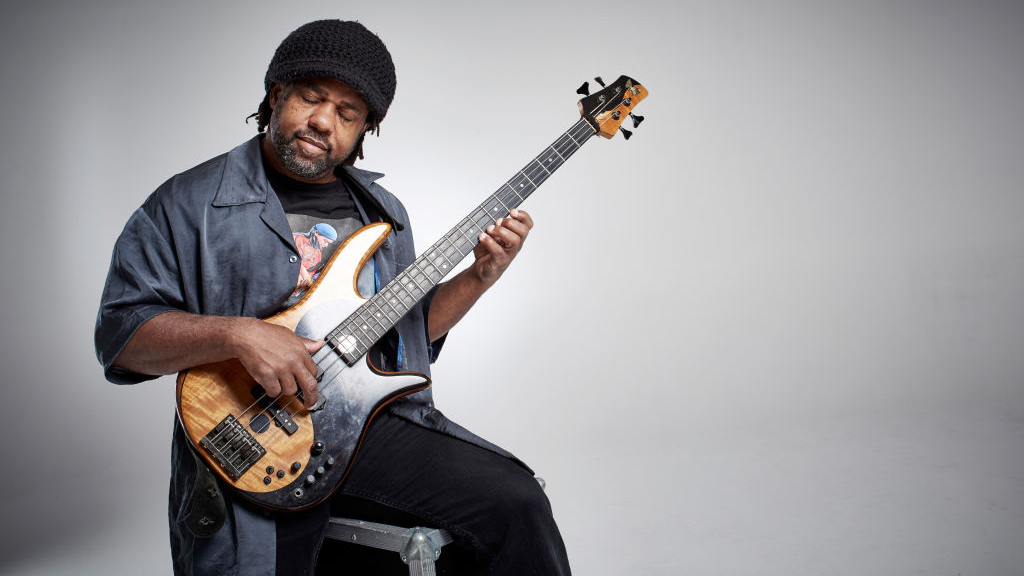
It would be fair to say a video meeting with Victor Wooten is not like most Zoom calls. When he connects with Bass Player, we find him sat in a room surrounded by green lights, red lamps, sofas and framed posters.
It has a vibe that will naturally appeal to just about any kind of creative, tailor-made to calm the mind and get juices flowing. Then, of course, there are various electric pianos and keyboards dotted around, as well as instruments hanging from the walls and a big mixing console right in front of him.
When we compliment the man on his working environment, we get a full guided tour, the multiple Grammy-winning bass player switching through various cameras to virtually invite us inside and show us around.
“I’m at my house in Nashville, Tennessee,” he smiles. “This is the studio where I record – it’s basically just a basement where I get everything done!”
It’s as striking as it is disarming – given that he’s one of the most technically gifted musicians in the world, with more than enough talent to terrify anyone brave enough to try and learn his parts, there’s nothing supercilious or standoffish about him at all. He’s genuinely as humble and down to earth as it gets.
Today, the jazz fusion mastermind is talking to us about the upcoming Victor Wooten and The Wooten Brothers tour starting in Tennessee at the end of September and ending in Illinois on November 11. As the name suggests, he’ll be joined by his longtime collaborators and real-life brothers Regi, Joseph and Roy, all of whom are well-respected and well-established virtuosos in their own right.
To call them a musical family would be technically correct, though also slightly flawed – these are players who have been working on their craft for as long as they can remember. They collectively live and breathe music, and together they’ve devoted their lives to mastering and understanding the art of conversations through sound. They released their first and only album back in 1985, so naturally there’s a lot of excitement about new material on the way...
Get The Pick Newsletter
All the latest guitar news, interviews, lessons, reviews, deals and more, direct to your inbox!
“It’s a big deal for us,” nods Wooten. “We haven’t toured as a family with new music in what feels like forever – putting all of our efforts, attention and energy into the family… which is how we started over 50 years ago!
“It’s nice to be back in this mindset, and the tour’s going to be off the hook! We’ll be releasing new music, but we also found some old stuff from the ’70s and ’80s with Rudy [saxophone] playing that’s also going to be coming out. Sadly, he passed away too early back in 2010.”
My earliest memory is Regi teaching me how to play bass when I was two. He would only have been 10 himself
Being the youngest of the siblings, Victor attributes much of his early musical development to his brothers. As he tells Bass Player, we’re all shaped by our immediate surroundings, at least until those teenage years of adolescence and self-discovery. In his case, he was living in close proximity with four brothers that were all obsessed with music – ultimately guiding him into becoming a musician that would change the bass world.
“When I was born, Regi, my oldest brother, was playing guitar, Roy was on drums, Rudy was on saxophone and Joseph was on keys,” continues Victor. “They needed a bass player and that’s pretty much all I’ve ever done since! I’m so lucky, I was surrounded by four of the greatest musicians I’ve ever heard. I was born into a family of geniuses. Not only are they great, they don’t think normally... they’re all musically out of this world.
“We were doing gigs before I started kindergarten. I was about five years old when we opened for War. We did part of Curtis Mayfield’s Super Fly tour around then too, which means Regi would only have been 13. My earliest memory is Regi teaching me how to play bass when I was two. He would only have been 10 himself. He also taught Joseph how to play keys. That’s why I’m the musician I am, but even more importantly, that’s why I’m the person I am.”
Being the oldest of the brothers, it was Regi who ended up being their de-facto musical leader – at least for those early days. Each of them ended up with superhuman creative strengths thanks to his mentorship and encouragement. Suffice to say, his efforts were not in vain…
“Regi always wanted all of us to be superheroes,” smiles Victor. “We were learning how to fly as little children and by the time we were adults we were up in the sky. We used to practice by jumping over garbage cans. Then we got bigger and started jumping over bushes. By the time we were in high school, we were jumping over houses. And by the time we were adults, we were flying.
“I was sharing a room with Rudy who would sit there playing two saxophones at once. Not just horn parts but actual lines, soloing on both at the same time, in unison and in harmony. Sax is an upright and vertical instrument, but if you play it on its side, what does it look like? I could see that as a kid, probably because I was laying in the bed while he was practicing. In my house there was no ‘You can’t do that’... it was always, ‘Just do it!’”
Here Victor talks us through the 10 bassists who shaped his sound…
1. Larry Graham
“I’m going to start here because most people know me because of my thumb and for me that started with Larry. On Everyday People by Sly and the Family Stone, it was just one note over and over, but it was a funky note. It wasn’t exactly the same note – even if everything else was muted and you were just hearing the bass, you’d start dancing to it. He’d throw in these different accents. As a kid, your ear picks up on these accents – that’s how you learn to talk. If you live in Spain, you pick up a Spanish accent.
“I was real young hearing this bass stuff because my brothers would make me listen and point it out to me. I was learning about the thumb and it was more than a technique… these days, people learn it as a technique, though I would say it’s more of a feel.
“You have to remember in the ’70s, we’d never heard this stuff before. We’d heard great finger stuff by James Jamerson and Chuck Rainey, both of whom are coming up, but all of a sudden Larry came along and something else was happening.
“We all wanted to know how he was doing it. One guy had the sound, so all the neighborhood players would get together and figure it out. For me, it was Regi showing me what was going on. So Larry Graham is a big reason why I have the sound that I have.
“The other thing I will say about him is that he was a complete musician. He wasn’t just a bass player. He could cross over from the heavy funk stuff and be a singing sensation. He had a few big hits, one of them was a ballad called One in a Million. A lot of people out there think he was just a vocalist. I love it when you get a musician who is broader than just the instrument they play.”
2. Chuck Rainey
“The next two come as a pair for me – Chuck Rainey and James Jamerson. Now the cool thing about both of them is that I didn’t know who they were until I was an adult, but I totally knew their music. I grew up with their playing.
“Of course, with Jamerson it was all that great Motown and soul music he was on. And Chuck too, but he was doing a lot of the bass playing on the TV shows I grew up with, stuff like Sanford and Son, The Jeffersons, Fat Albert and the Cosby Kids. I only realized later on that it was Chuck Rainey.
“I danced as a kid and used to like The Jackson Five because whenever they did the song Dancing Machine, I knew Michael would start doing the robot somewhere in the middle of that song. And that was Chuck on bass! I know that song inside out, but I didn’t know his name at the time.
“In my opinion, Chuck’s strength was rhythm. I even heard him say that he didn’t play a lot of notes; he just played a lot of rhythms on the few notes he chose to play. He would always go up and hit that high 10th or the 3rd up there… that was his signature move. I can go back now and see his genius was rhythm.”
3. James Jamerson
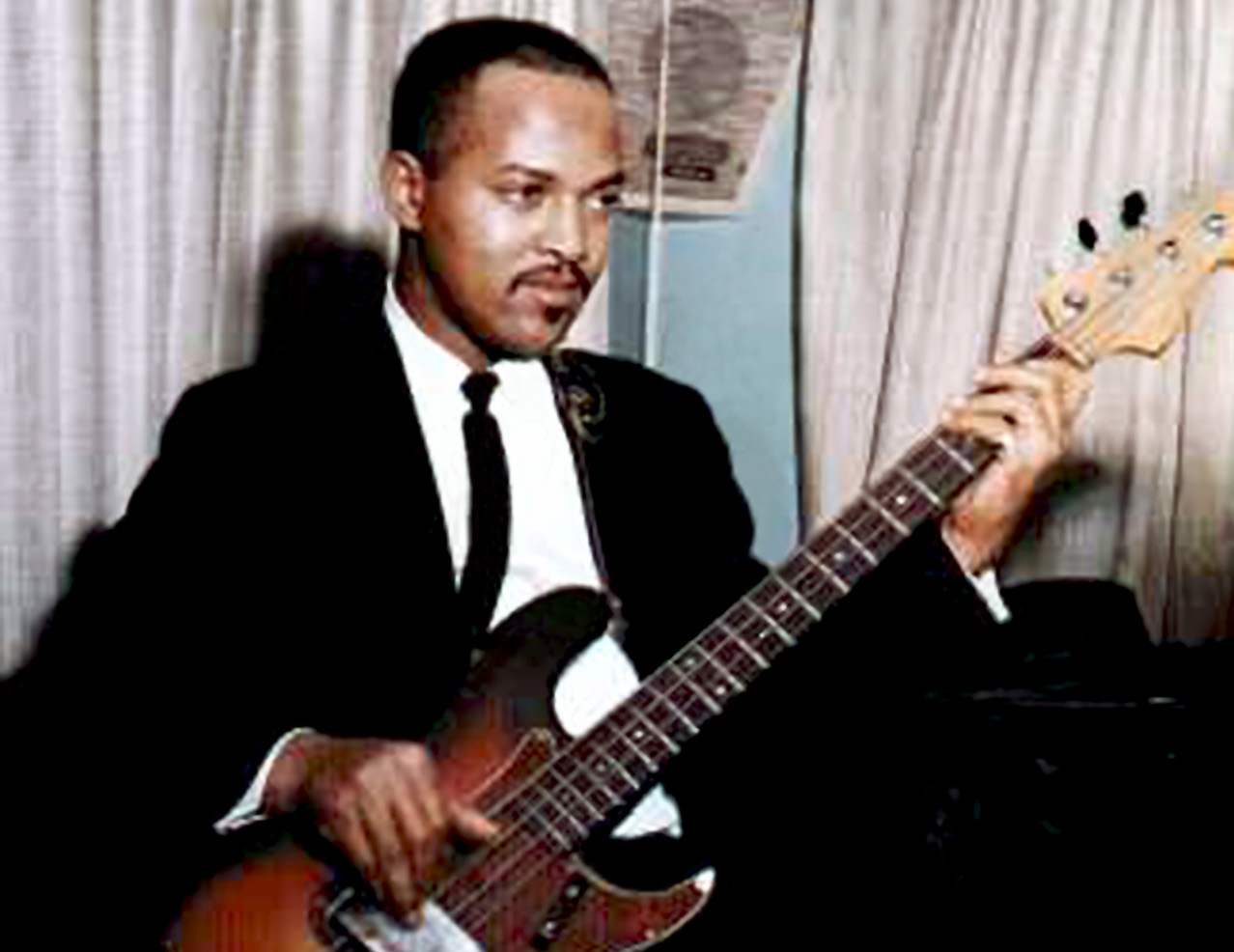
“There’s so much classic music from James Jamerson. There are too many to mention from that era, from Carol Kaye to ‘Duck’ Dunn to Bob Babbitt. They all shaped me as a bassist, but Jamerson most of all. I didn’t even know who he was until The Motown Book came out. He also had impeccable rhythm, but his thing was note choice.
“When I listen back now as an adult, I realize that Jamerson knew every chord he was playing over. And he did not just play the root; he could outline the chord in a way that didn’t sound like he was overplaying. And that’s genius, because most of us wouldn’t be able to make it feel as good. I say ‘we’ because I don’t have that skill, either! The rest of us play too much with not enough feel, in a way that makes other people say, ‘Hey, just play less!’
“Jamerson could get away with playing all over the neck because it never sounded like he was soloing. The way he moved around always felt like the bass part. That’s what people miss these days. They forget the movement and feel of a bass part; it’s more like, ‘Here’s the bass part and now I’m soloing!’ His lines had motion to them that unconsciously told you where they were going and land you there in a beautiful way.”
4. Stanley Clarke
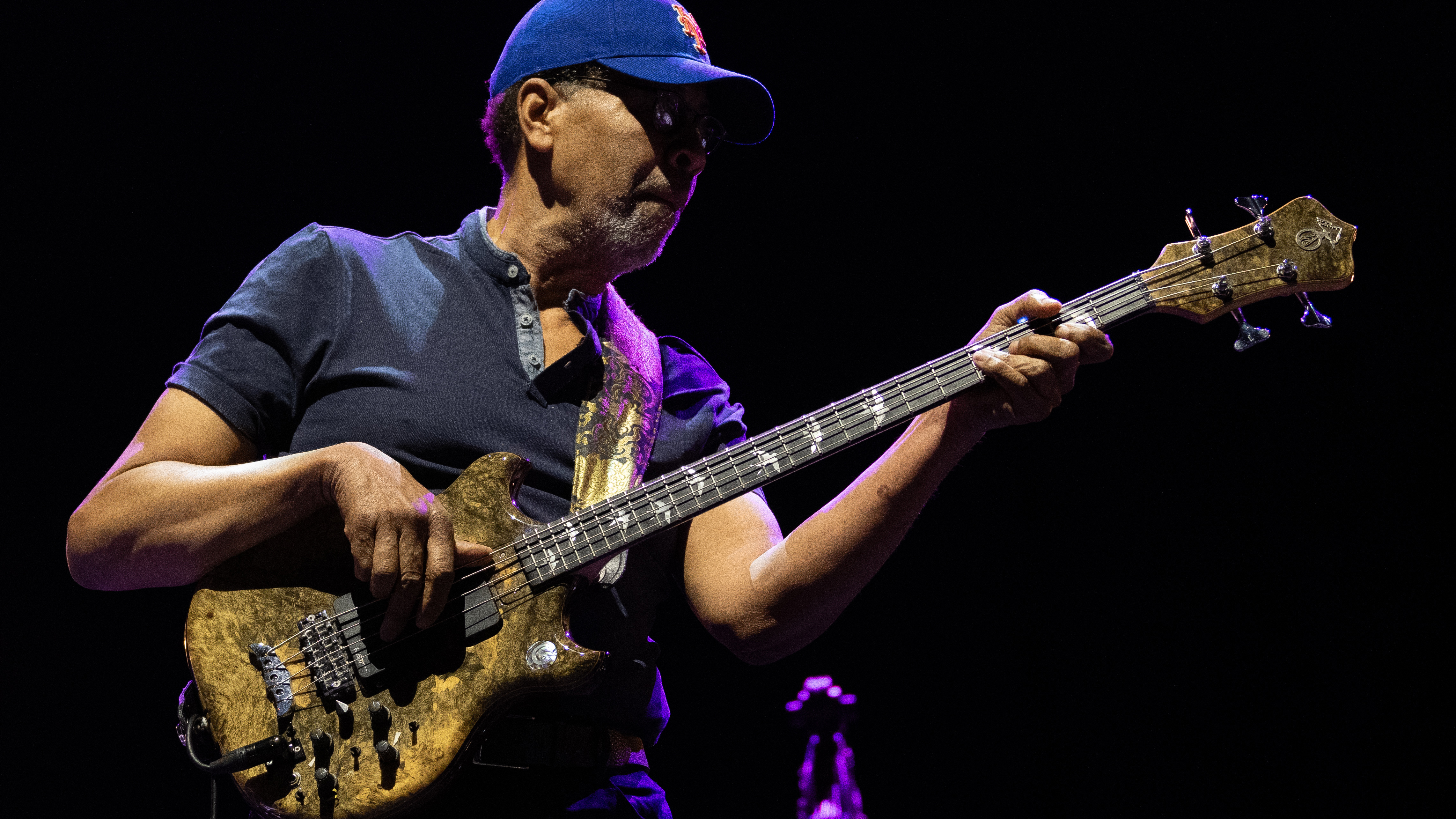
“After Larry Graham started getting a little flashy, showing people what a bass could do on songs like Hair, Stanley took it to the outer limits. Oh my goodness. I’d never heard bass playing with that kind of fire. With those two fingers, Stanley sounded like a machine gun going way up high. I heard that and thought, ‘Who is this guy?!’ And you’d see a picture of him and he’d be taller than the Washington monument with this great big afro.
“I got to meet him when I was nine. Regi would have been 17, so he could drive by this point. We went to see Stanley in Hampton, Virginia at a place called Ogden Hall. The show was incredible and blew us away, of course. It was him with Chick Corea, Lenny White and Al Di Meola playing as Return to Forever. Stanley was killing it with all his solos.
I asked Stanley Clarke if he had a broken string I could have. He wrote me his address and told me to mail him and he’d send me something. And I did and he did. We’ve been friends ever since
“After the show was over, we just didn’t leave, so they let five little kids into the dressing room. I remember walking in and Chick, Lenny and Stanley were all sat at the table. I don’t know why, but Al Di Meola was riding a tricycle! There was one in their dressing room and he was having fun on it. Stanley was there with his big afro and he was like a god to me. He still is… I mean, I got to meet him at the age of nine!
“I asked if he had a broken string I could have. He got out of his chair and I was like, ‘Woah, man!’ because he was so tall and skinny with this big fro. He was looking around but couldn’t find anything, so he wrote me his address and told me to mail him and he’d send me something. And I did and he did.
“We’ve been friends ever since. He’s like a big brother that’s always treated me well. He’s been in my corner the whole time, helping me out. Getting to record and tour with him, as well as visit him at home, is unreal. I even own one of his old basses!”
5. Marcus Miller
“Marcus is unprecedented as a player. But he’s so good, he can play on something and you won’t know it’s him. Now, of course, he has his own distinct sound, but there’s stuff you’ve probably heard him play without knowing it was him. He’s another one who is more than just a bass player; he’s a very well-rounded musician.
“When I learned more about him as an adult, I realized all that great Luther Vandross stuff was written and produced by Marcus. ‘That was him playing bass, producing and writing? Bass players can do that? Really?!’ Of course there’s no question he’s a great player…
“But I learned more about being a complete musician – writing, producing, working in the studio – through Marcus. Everything he plays is perfect. He also knows how to take solos without needing another bass player underneath. Most of us do that and suddenly the bass is gone and the song sounds weak. Not with Marcus! He has this uncanny ability to improvise and pull out solos, but the bass has not left the building.”
6. Paul McCartney

“Even though he wasn’t on my radar as a kid, he’s a big one for me. I would say he’s the pinnacle of simple excellence. In other words, it’s one note at a time but every note is perfect and seems intentional. He’s another one who doesn’t just have to play the root at the beginning of the measure and you don’t miss the root if he chooses not to hit it.
“As an adult listening to him, I realized he must have been a guitar player first, because of his note choices. In my opinion, he’s not totally thinking like a bass player, but he knows how to make the bass work better while singing and writing.
“He was a surprise to me because I didn’t grow up as a Beatles fan. It’s not that I didn’t like them, it’s just I grew up right when Motown was happening. Us Black kids were listening to Motown, we weren’t listening to the Beatles [laughs]! But when I grew up and joined Béla Fleck, I realized how much he was into the Beatles. And that’s how I got into them.”
7. Ron Carter
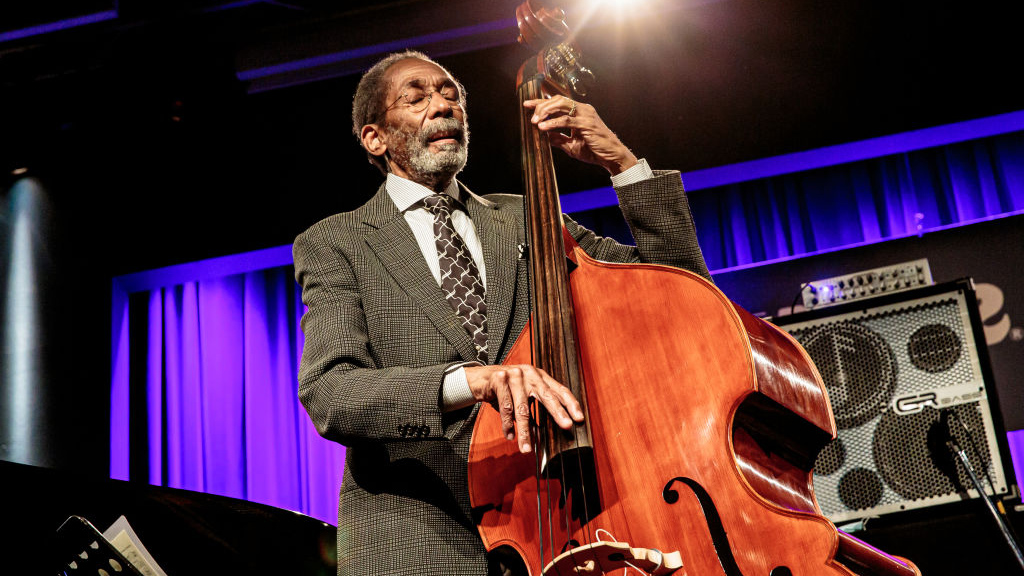
“Ron Carter and Ray Brown were my conscious introduction into upright playing. My brothers got into jazz, and I was always a little behind them, but I eventually got into it too. I could hear the beauty of the upright bass and how much that instrument made me like this music I was starting to hear more often.
“When my brothers got into Miles Davis, I felt like Ron Carter was a big part of the sound. Him and Ray were so excellent and so similar, yet so different at the same time – it’s hard to explain. They had their own unique voices but also a lot in common. It’s like hearing two people talk. They might be saying the same thing, but every voice is slightly different.”
8. Ray Brown
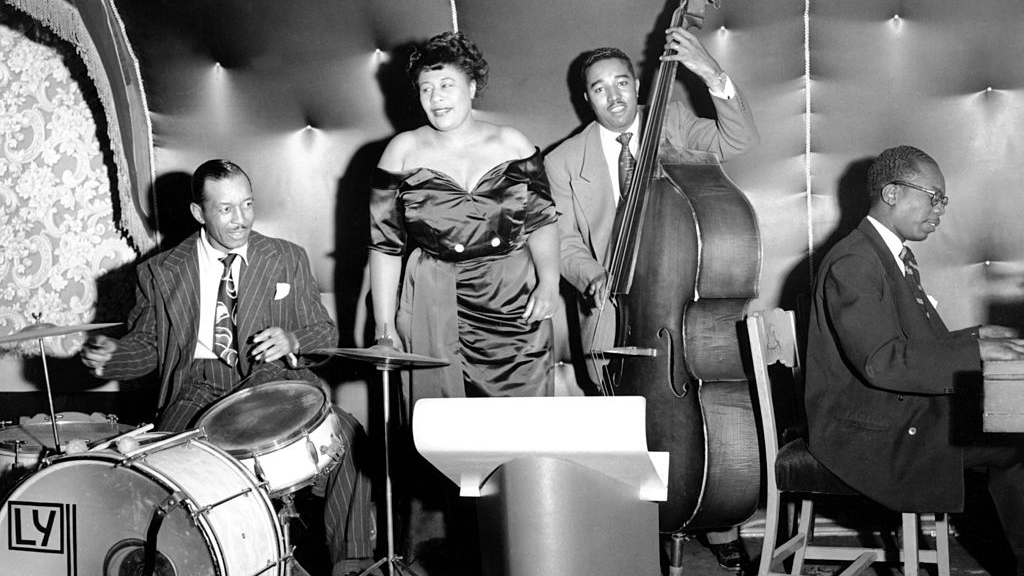
“My brothers also used to make me watch this television show, The Merv Griffin Show. And every once in a while there would be this little Black man playing upright in the background and that was Ray Brown. He was total excellence and his feel was uncanny, thanks to the way he walked that bass and made your body have to move.
“When it comes to upright players, Ron and Ray are my favorites because, again, the note choices were so intentional. If you sing their lines, you can hear the song. They’re not just walking, they’re telling stories with their bass parts – the song could exist just through what they’re playing.”
9. Jaco Pastorius
“Hearing Jaco changed my life. I never met him but he taught me so much, particularly about the sound of a fretless bass. My second bass was an Alembic because I was such a Stanley Clarke fan. But I took the frets out of my first bass because of Jaco! Through him I learned how to perform with the bass. He could make you like the bass, whether you liked it or not.
“He created a whole new sound that us bass players didn’t have before, which is the sound of a fretless. It wasn’t really a musical voice before Jaco. I mean, it was there – other people were playing them like Alphonso Johnson in Weather Report. But no-one made it sound as powerful as Jaco did. There were others after Jaco, but he exposed us to a new sound and new techniques. He was such a talented composer – that’s something that always came across in his music.
“When I first heard Birdland, I remember living in Virginia as a kid and someone said ‘Yeah, that melody, that’s the bass!’ And I couldn’t believe it. He was playing up high and making his bass sound like a keyboard. When someone showed me how to do it, my whole world changed – ‘I can do that on a bass?’ – playing any note as an artificial or false harmonic.
“So I pulled the frets off my first bass, this Univox, trying to find the sound but didn’t quite get it right. But there was a local guy called Rusty Springfield who could do it, so he’d show us different things as well as gear like chorus pedals.
“Sadly, Jaco left us too early. He lived in an era where the medical field didn’t understand what he was dealing with enough to help him out. Nowadays, I think they’d be able to help him more. And then of course there was his bout with drugs.
“When you’re famous and get money you have to be stronger to not get sucked into the downsides of success. In schools we can learn how to obtain success, but nobody shows you how to maintain it. You have all this money to buy all the stuff that’s not good for you. Everyone’s pulling on you and saying, ‘Have a drink,’ or, ‘Try this.’ Sadly he never got the help he so needed.”
10. Regi Wooten
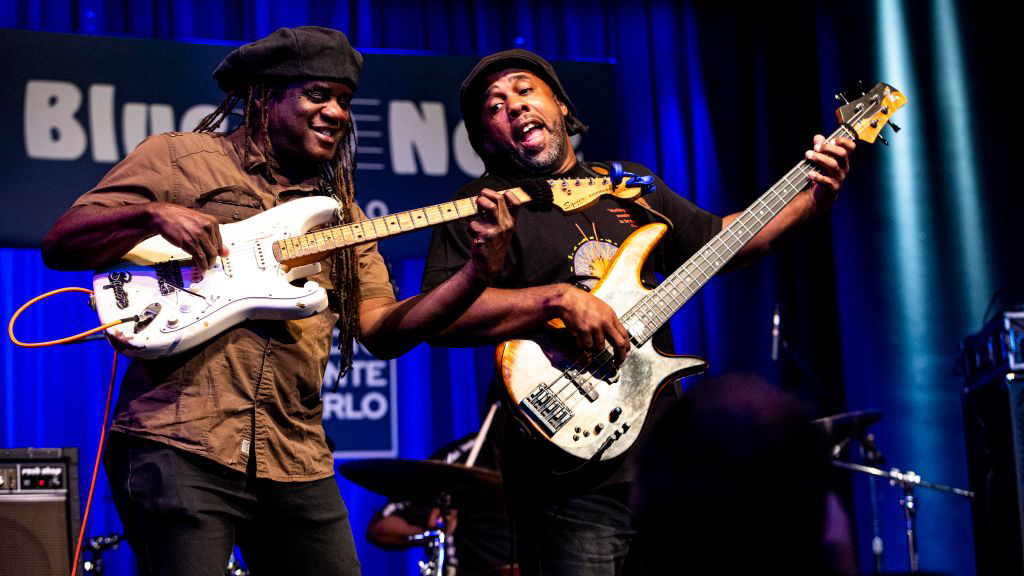
“My brother Regi is one of my favorite bass players of all time. It’s where my playing and musicality comes from. There are even songs on my records where I got Regi to play bass and people just don’t know it. He’s an amazing musician who can play with his fingers or his thumb or with a pick, plus two-handed tapping. It doesn’t matter what style, whether it’s jazz, funk or rock, he can do it so well.
“When I was a kid, him and Roy shared a room and it always struck me how they sounded so complete. It’s like they could sit there and play a whole song – rhythm, bass, chords and melody. Regi could pick up my bass and play chords, so I figured, ‘What’s the big deal – I’ll try to learn more about what they’re doing.’
“Roy had all these rhythms. I studied all his drum books, learning about paradiddles, double paradiddles and everything else, taking that to my bass. And I could give my bass to Joseph, he’d lean it on his lap and tap on it right away without needing to practice. There was a lot of creativity in that house!”
- The Victor Wooten and The Wooten Brothers tour kicks off September 28 in Chattanooga, TN. For tour dates, tickets, and info visit victorwooten.com.
Amit has been writing for titles like Total Guitar, MusicRadar and Guitar World for over a decade and counts Richie Kotzen, Guthrie Govan and Jeff Beck among his primary influences as a guitar player. He's worked for magazines like Kerrang!, Metal Hammer, Classic Rock, Prog, Record Collector, Planet Rock, Rhythm and Bass Player, as well as newspapers like Metro and The Independent, interviewing everyone from Ozzy Osbourne and Lemmy to Slash and Jimmy Page, and once even traded solos with a member of Slayer on a track released internationally. As a session guitarist, he's played alongside members of Judas Priest and Uriah Heep in London ensemble Metalworks, as well as handled lead guitars for legends like Glen Matlock (Sex Pistols, The Faces) and Stu Hamm (Steve Vai, Joe Satriani, G3).
“I asked him to get me four bass strings because I only had a $29 guitar from Sears”: Bootsy Collins is one of the all-time bass greats, but he started out on guitar. Here’s the sole reason why he switched
“I got that bass for $50 off this coke dealer. I don’t know what Jaco did to it, but he totally messed up the insides!” How Cro-Mags’ Harley Flanagan went from buying a Jaco Pastorius bass on the street to fronting one of hardcore’s most influential bands











